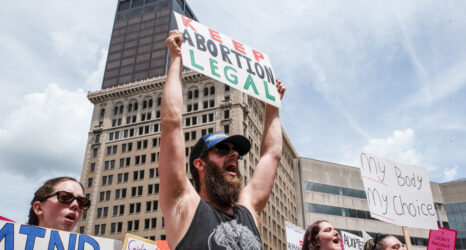“Asian Americans must become more civically engaged for the liberation of all people. I now call myself an Asian American woman as a political act and exercise my vote as an act of resistance and solidarity with marginalized communities.”

My father arrived in 1985 and my mother in 1989 during a time when Koreans were one of the largest immigrant groups in Philadelphia.
With the vast majority of Korean Americans in Pennsylvania living in the Greater Philadelphia area, I was privileged to be born and raised in the suburbs with a large Korean American population, most often connected through public schools and churches. From this upbringing, I realized how much the middle-class suburban lifestyle settled my family and my community into a complacency—one that doesn’t acknowledge that our immigrant history is directly tied to civic engagement.
Let’s not forget, it was Black civil rights leaders who fought for the Civil Rights Act of 1964 and the Voting Rights Act of 1965, that paved the way for the passage of the Immigration Act of 1965. And thanks to the power of the civil rights movement, our parents were able to immigrate to the United States from Korea.
Like many Korean immigrant families, my family attended a first-generation Korean American church and rarely discussed politics. My parents were too busy concerned about our survival, and language barriers with long workdays made it difficult for them to keep up with the news.
Existing institutions were not accessible to my parents, but the church was able to provide the shared identity and language they needed. Though Korean American churches continue to serve as significant cultural hubs, I continue to be disappointed by the lack of our community engagement with surrounding neighborhoods. And although we find comfort in these spaces, we can no longer afford to be settled in our complacency.
Our altruistic efforts to address social issues such as homelessness, poverty, climate crisis and health care are lifted up through collective prayer—yet hardly followed up with a plan of action to address them. There tends to be more focus on short-term volunteering and direct service, but not enough on long-term organizing and civic engagement.
All social issues are political issues. If Jesus was a radical man who cared about political issues and marginalized communities, it is time for our churches to start engaging for radical changes in the system.
I have been on a long journey to realize that everything about my survival and identity is political. We check our boxes, self-identifying as “Asian American,” without unpacking the term which was first used as a radical political identity in the late 1960s to unite a group of Asian Americans from different ethnicities to stand for equality and against racism and imperialism. Asian Americans must become more civically engaged for the liberation of all people. I now call myself an Asian American woman as a political act and exercise my vote as an act of resistance and solidarity with marginalized communities.
As a former special education teacher at a Philadelphia high school and reentry caseworker in the Philadelphia Prison System, I have directly witnessed our institutions fail to serve our low-income Black and brown neighbors. Because I have seen the consequences of our systemic failures with housing, immigration, employment, education, health care and criminal justice, I feel called to organize my community for systemic changes.
Now is the time for Asian Americans to come together to fight for racial, economic and social justice. As we reflect on our role and personal relationships, it is especially important to consider our strategy in mobilizing those who are apolitical.
While Asian Americans and Pacific Islanders are the fastest growing racial groups in the country, we have over 230,000 Asian Americans in Pennsylvania who are voter eligible but have not registered to vote. Therefore, it is on us second-generation Asian Americans to find translated and accessible resources by leaning into our communities. Voting is just one of many tools that we should be utilizing to organize for the changes we want to see for ourselves so that people no longer struggle to survive.
We cannot let apathy be an option anymore. The national response to COVID-19 and racial uprisings has further exposed our existing systems as violent and inadequate. We need to make sure that we are not just showing up for these moments of righteous anger, but that we also have an eye towards a future that Black, brown and Indigenous folks have been fighting for long before us.
We must encourage our communities to use our collective voice and demand justice for all. We must continue to build the momentum on the streets. And we must make sure our protests are followed with our votes.
You may also like:





